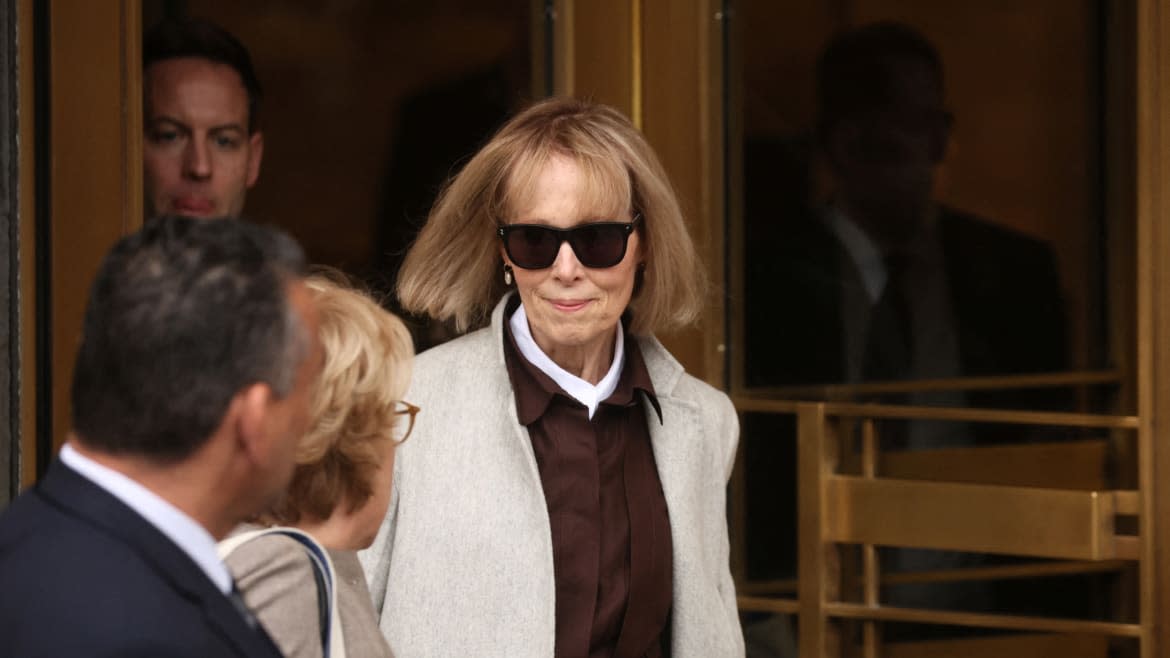Psychologist Tries to Close the Gaps in the E. Jean Carroll Case

- Oops!Something went wrong.Please try again later.
- Oops!Something went wrong.Please try again later.
Why can’t E. Jean Carroll remember when Donald Trump allegedly raped her? Why didn’t she scream? And why did she keep the dreaded coat dress hanging in her closet for decades?
On Wednesday, Carroll’s lawyers used the testimony of a psychologist to try to close the gaps that the former president’s lawyers have tried to attack.
Leslie Lebowitz, a Massachusetts psychologist, spent hours describing the trauma Carroll feels over the way she was allegedly attacked by the real estate mogul sometime around 1996 in the fitting room of the luxury Manhattan clothing store Bergdorf Goodman. But her testimony primarily served to buttress Carroll’s actions in the years that followed, what to some would seem like a double life—outwardly vivacious yet quietly plagued by haunting flashbacks.
“Memory is actually a complicated process,” she said when being questioned by Carroll’s lead attorney, Roberta Kaplan.
Trump Jury Hears Accusation He Groped a Woman on a Flight
So far, the six men and three women on the jury have heard Carroll and a close friend describe—in explicit detail—her encounter with Trump at the store and a harried phone call in its immediate aftermath. But Carroll hasn’t been able to say when it happened with any certainty, eliminating any chance for Trump to provide an alibi.
For days, Trump’s lawyers have aggressively probed that lack of detail and used it to cast doubt upon her allegation, chalking it up to a contrived political plot.
On the stand, Lebowitz said, “Our brain holds onto things that seem emotionally salient” but not other details, like context. So while we may replay key details of a traumatic event, we may forget its place in time during our lives. She also testified that the chemicals that encode these memories in our brains are quite toxic, so a person might easily remember exactly how a harrowing situation began but not what happened afterward.
Addressing the odd way Carroll kept the black dress hanging in her small closet for decades—apparently unworn all that time—Lebowitz surmised that the outfit carried a deeper, unspoken meaning for the fashion-conscious advice columnist.
“Rape… feels like their personhood is being murdered,” she said, adding that Carroll likely kept the dress in the hope that she would one day “claim a part of herself she once lost.”
The crime of rape, she explained, can harm the very core of a person’s being because it violates their humanity, independence, and the sense that they own their own space.
When it was their turn to cross-examine her, Trump’s lawyers focused on showing that Carroll could have simply faked symptoms to dupe the psychologist. They also kept probing why Carroll didn’t scream during this alleged attack at a store in Midtown Manhattan—a question that keeps drawing ire over its sexist undertones.
Trump Lawyer Joe Tacopina’s Terrible Cross-Examination Gets Even Worse
“It is one of the least likely responses to a rape,” Lebowitz told Trump defense lawyer Chad Seigel. “Sure, some people scream. It’s a good idea.”
Seigel also noted apparent discrepancies, such as the way Carroll claims Trump deeply harmed her life but still considered herself a “massive fan” of his popular reality TV program on NBC, The Apprentice. Lebowitz countered that, given Carroll’s social circle as a New York journalist, it would have been odd for her to make a conscious effort to avoid the show—particularly because it would have drawn attention to a traumatic memory she was trying to bury.
Trump’s lawyers pressed on with their effort to have the jury disbelieve that Carroll leads two very different lives, with one as a cheery advice columnist who tells readers to immediately call the police if they’re raped versus the emotionally wrecked writer who wasn’t able to follow her own advice.
Standing at a wooden lectern, Seigel showed the jurors a segment of the book where Carroll initially disclosed her encounter with Trump—one that read, “I am fine. I can’t explain it, but I never suffered.”
Seigel asked Lebowitz to explain the discrepancy with her testimony now that Carroll is in fact deeply hurt by what allegedly happened in that fitting room—and subject to searing flashes of those memories.
“We present ourselves differently” in private and public, she countered.
Lebowitz’s psychoanalytic expertise previously played a role in the trial of a Connecticut robber who took part in a savage rape and killing, in what’s sometimes referred to as the Cheshire home invasion. Her testimony is expected to end Wednesday, and the jury will soon hear from a third alleged victim of Trump’s sexual misconduct.
The judge said Wednesday that closing arguments are likely to be heard early next week, with the jury receiving the case right after.
Get the Daily Beast's biggest scoops and scandals delivered right to your inbox. Sign up now.
Stay informed and gain unlimited access to the Daily Beast's unmatched reporting. Subscribe now.

